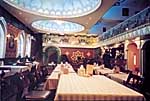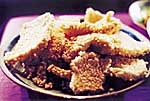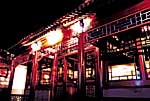|
If you like subtlety, GET THE HELL OUT OF BEIJING NOW! But if you
appreciate the intriguing juxtaposition between jackhammer and ancient alleyway, yellow-helmeted migrant worker and vinyl-clad city dweller,
choking air pollution and stunningly clear, blue autumn skies, you might
find yourself staying in China's bizarre capital city for longer than you
planned.
And if you stay here for any length of time, one day you will find yourself
sitting in an Audi with tinted windows and paramilitary license plates, driving down a newly-widened street lined with faux-Qing Dynasty store
fronts. The stores themselves are all empty, but they are lit up with fairy
lights and boast fluttering red flags.
You will turn south and then east and drive down a very narrow hutong. You
will get out of the car in front of an imperial red door set back in a gray
brick wall. You will walk though the doorway into a real Qing Dynasty courtyard house in immaculate condition and enter the south facing
courtyard. And then you will find yourself sitting in a comfortable leather
and wood chair, contemplating the dark brown wooden ceiling beams that a
carpenter lovingly hand-carved more than 200 years ago.

But you don't need to be in Beijing for more than a decade garnering guanxi
for this to happen. This is the age of the instant China Hand! Get on your cell phone! (If you don't have one, read the second phrase of
this article again.) Phone Beijing Taxi Corporation (6701-5113), and ask
for a black Audi to drive you around for the evening (about rmb 200). Tell
the driver to go the Red Capital Club, house number 66 of the ninth hutong
of Dongsi, a few kilometers east and a hundred meters south of Worker's Stadium Road.

As its name suggests-and like the city of Beijing-the Red Capital Club is
not understated. It is, however, fascinating. The menu reads like the Kama Sutra. Divided into sections with names like
'Entering the Moon Gate' (more prosaically known as 'soups') and dishes named Empress Dowager's Dream, you might find yourself wondering just
what services are on offer at this luxuriously appointed restaurant in a
courtyard house in an alleyway.
Red Capital Club does offer the diner a sensual experience, but instead of
the Sir Richard Burton-style orientalist thrills you might expect to find
inside the, er, 'Moon Gate,' you are treated to a meal of well-prepared,
beautifully presented Chinese food of the style the restaurant calls 'Zhongnanhai Cuisine.'
Zhongnanhai (literally Central and South Seas) is the massive villa-like
complex of gardens, meeting rooms , underground tunnels and residences next
to the Forbidden City where many of the Communist Party's highest leaders
have lived since 1949.
Foreign businessmen, journalists and even 'foreign experts' (ie teachers
with big noses who agree to work at Chinese universities for cut-rate wages) are frequently treated to banquets at The Great Hall of the People
and other government venues. But a state banquet at Zhongnanhai is a special treat reserved only for top-ranking cadres, senior foreign
government officials, capitalists like Bill Gates who think Platinum Amex
Cards are for the lumpen proletariat, and that dubious breed of sycophants
with Chinese characteristics-"consultants."

Red Capital Club offers mere mortals a chance to sample the culinary delights served to paramount leader Jiang's honored guests. The food
consists of both so-called Imperial Cuisine and a selection of favorite dishes of the People's Republic's first generation of leaders. Fortunately
those leaders are from all over China, so there is a wide variety of food
ranging from a Sichuan-style chili chicken dish named 'Deng Xiaoping's Spice of Life' to Chairman Mao's favorite fatty fillet of red braised
pork-hongshaorou. There are a number of tasty vegetarian dishes, both hot
and cold, and there are enough laowai favorites like the sweet and sour Crispy Tofu (cui pi doufu) to give out-of-town guests a taste of China
without any bones or weird ingredients.
If menu items like 'Empress Dowager's Dream' and 'Chairman's Request' don't
pique your curiosity, you might still be intrigued by the Red Capital's Bomb Shelter-cum-wine cellar, complete with Cultural Revolution slogans and
Dr. Strangelove-style hot line phones (ask the staff for a flashlight-led
tour). Other authentic Party trinkets that will delight Sinophiles include
the overstuffed lounge chairs in the cigar divan in the western building of
Red Capital's courtyard. Obtained by some miraculous feat of guanxi, the
chairs come from Zhongnanhai itself. One of the chairs was actually used by
one of the first Cultural Revolution Committees, the tightly-knit radical
groups that undermined State power during the ardent early days of the (1966-76) Cultural Revolution. An original piece of Chairman Mao's
calligraphy is displayed in the same room. Even a visit to the toilet is
enhanced by Cult Rev chic. Men get to wash their hands at an antique porcelain basin beneath a fading sign commanding: "Obey Chairman Mao!"

Although Red Capital Club is not cheap-plan on about rmb 200 per person
(with wine)-if the Great Helmsman himself were alive today, he would probably not brand the restaurant reactionary. After all, the Great
Revolutionary Leader welcomed rich businessmen like Rong Yiren to stay on
the Mainland after 1949 to help reconstruct the Motherland. He dubbed them
'Red Capitalists,' although like today's government, the color of the capitalists was probably less important to him than the color of their
money.
Our meal was enlivened by a corporate party at the neighboring table composed mostly of lawyers from Arkansas. After a tour of the restaurant's
wine cellar/bomb shelter-one of these redneck capitalists ganbei-ed a glass
of Red Capital Bordeaux (the house wine) and exclaimed: "I didn't know Communism could be so much fun!"
|







